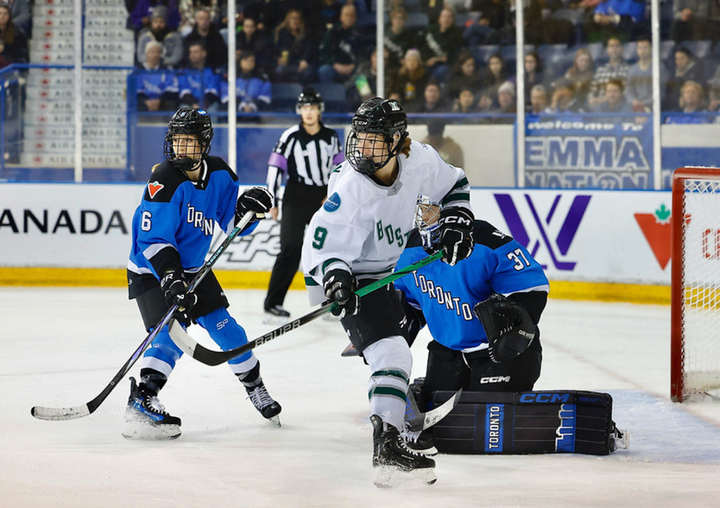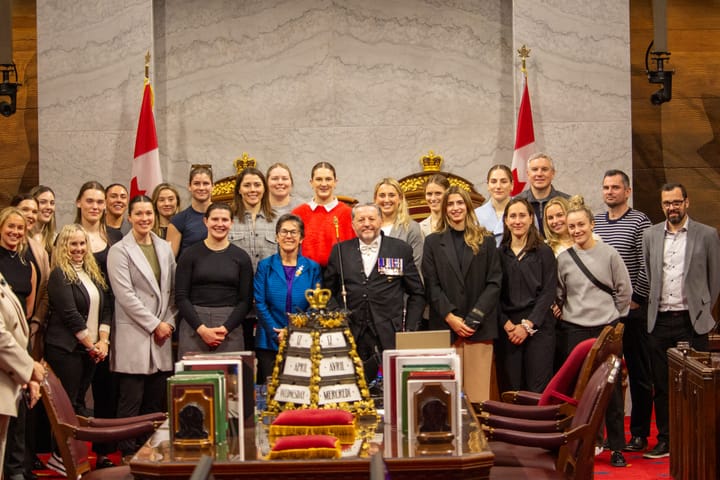Boston College’s coaching tandem continues to orchestrate success
Behind Crowley and Kennedy’s 300-plus wins at BC is a lasting friendship that’s changed the program
Over the last 12 years, the Boston College Eagles have established themselves as the class of their conference, and women’s college hockey at large. They have vaulted to the top of the national rankings, are in the running for serious hardware every single season, and regularly produce Hockey East All-Stars, Patty Kazmaier Memorial Award finalists, and All-Americans.
Before any of that came to fruition for the Eagles, before head coach Katie Crowley notched even one win at the helm of the program, back in the 2007 offseason, she had to build her staff and bring on an assistant. There was one thing, first and foremost, that she was looking for.
“I wanted someone that would first be more of a defensive mindset than myself, which doesn’t probably take too much,” she laughed.
With that in mind, the first person she reached out to was Courtney Kennedy, a former teammate of hers with the U.S. Women’s National Team. She didn’t have to do much convincing.
“To be honest with you, I just said yes,” Kennedy said. “I didn’t have any poker hand. I didn’t ask about any money or anything. I just was like, ‘Yep, I want to do it.’ And we’ve been together ever since.”
Crowley and Kennedy first met each other when they were playing hockey growing up. They played for the same program, the Chelmsford Lions, though Kennedy was a little younger. She would stick around when the older teams needed extra bodies in practice, which is how she first got to know Crowley.
“Obviously I was very intimidated by her,” she said of Crowley. “She’s older. She’s like this goal-scoring phenom, you know?”
Eventually, though, they became good friends from their time together on the national team. Kennedy was coaching for Buckingham Browne & Nichols School when she got the call from Crowley about the Boston College job. She knew it wasn’t an opportunity she was going to pass up.
“For most of my life, I’d say all of my life, every decision I’ve made, I’ve kind of followed my gut,” Kennedy said. “And my gut was like, ‘Yeah, let’s do this.’”
The plan early on was to keep the program moving forward. The team had recently made a trip to the 2007 Frozen Four, the first ever for BC. But Crowley and Kennedy also knew they wanted to establish a program that embodied more than just a winning hockey culture.
“[The goal was] to help grow our program and to get it to be not only the best that it can be but to have players that come through here who, after their four years, really enjoyed their time here,” Crowley said. “If their goal is, after this, to play for a national team or whatnot, then we try to help them get to that level. And if it’s to get a good job and move away from hockey, then we try to help them get to that point.”
With that mindset, they’ve been able to build one of the most successful programs in women’s college hockey. They recorded their 300th victory with the Eagles earlier this month. But they remained a two-person coaching staff for quite awhile; current assistant coach Courtney Sheary didn’t join the team until 2017-18. That made it even more imperative for Crowley and Kennedy to have a good working relationship, and efficiently attack the workload that comes with running a hockey team.
“Most of the time I know what she’s thinking, and most of the time she knows what I’m thinking before we even say anything,” Crowley said. “For so many years, it was just the two of us, and I feel like we read off each other pretty well. There’s times where we challenge each other to help make our program better. And there’s times where we will agree and [times where we] don’t. I love that we have that relationship where we can have great discussions about hockey and great discussions about different things to keep in mind, and know that the ultimate goal is trying to get our team better.”
As a longtime assistant, and now the associate head coach, Kennedy in particular has taken on responsibilities that go beyond just coaching practices and helping the players get better at hockey. She’s the one leading Boston College’s recruiting efforts, and she oversees the team’s hockey operations, too. Coordinating with hotels, planning team meals, and organizing all of the logistics that make a hockey team run are all tasks that fall into her lap. But it’s a role she actively embraces.
“I enjoy setting up the day,” Kennedy said. “I like to be involved in making sure everything goes smoothly. We get adversity. We know there’s going to be bumps in the road. Maybe a bus doesn’t show up or it breaks down. We’ll figure that out. But in the end I like to make sure that it’s kind of a seamless day for the kids.”
More importantly than individual coaching responsibilities, the two have found a good rhythm for tackling their duties together. And they’re not afraid to challenge each other, either.
“I think we feed off of each other’s strengths and weaknesses in terms of just different things within the program and how we do things,” Crowley said. “She’s strong where I’m weaker and I feel like I’m stronger where she’s weaker. So I think we definitely mesh well together.”
Crowley can be more deliberative when it comes to making decisions, carefully weighing each option. But Kennedy often brings a different way of looking at things, and she isn’t hesitant about mixing up the schedule and trying out something new to keep the players loose.
“I think that what I offer [Coach Crowley] is just a different way of looking at success or a different way of looking at what it means to be elite that day,” Kennedy said. “I think [Coach Crowley] and I are perfect together because where she might be thinking we have to practice today at two hours, I come in and say, ‘Why don’t we go an hour and 15 minutes? Let’s just cut way down. Let’s give a mental break.’
“I find that that’s what makes us successful is the give and take from each of us where we listen to each other. And I think the combination of what we come up with is pretty cool.”
They’ve learned a lot from each other over the years. Crowley says Kennedy, who so often follows her gut, has learned to take a step back and evaluate before making a decision. And Kennedy’s open mind and added perspective is something that Crowley appreciates, too. They are constantly pushing each other to be better coaches, and in turn, pushing the team to be at its best.
“We have that relationship where she can say, ‘No, I think we should try this,’ and sometimes we do and sometimes we don’t, and sometimes we have that discussion about it,” she said. “Whatever route we end up taking from that discussion, that part doesn’t matter. But we’ve been talking about it and trying to make things different and better and and work for our team.”
There’s no doubt they’ve done so for BC. Winning 300 games over a 12-year span is a surefire sign of success. It pretty clearly points to a team that clicks, and a culture rooted in hard work and competitive spirit and the constant pursuit of progress. There’s probably a lot of fun times on the road to 300 wins; lots to celebrate and enjoy together.
Another thing all that winning can do, though, is magnify the losses that come along the way. And the Eagles have had some tough ones. Like in 2016, when they went undefeated up until the national championship game and lost. Like in 2011, 2012, 2013, 2015, and 2017, when they advanced to the Frozen Four but came up short there, too. Like this year, when they returned three Olympians and last year’s Patty Kazmaier winner and dropped six of seven games in the middle of the season.
For as much as they’ve learned about winning, they’ve also had to learn a lot about losing, too.
“I think that was a dangerous thing happening at this school, where kids weren’t losing ever,” Kennedy said. “It just wasn’t normal. They didn’t understand it, where I think one of the biggest teaching pieces is a loss.
“I want the kids to know that those losses are tough, but the worst thing that will happen is if we don’t learn from it. That’s the worst thing that can happen, is if you lose a game and you point fingers everywhere else and you don’t learn from the experience.”
So, instead of letting a national championship drought dictate how they approach coaching, Crowley and Kennedy have embraced it as part of the process and an avenue for improvement for the next year.
“You keep moving forward and as long as our players are continuing to enjoy their experience, then we will get that national championship eventually,” Crowley said. “There’s a lot that goes into all of that. And I don’t think we’re overly concerned. I think we work at it every day and try to become a better hockey team and better people every day, and we think the national championship will come.”
Beyond the skill on the ice, and the drive to get better and bring home that elusive national title, there’s one other thing that’s strikingly obvious about BC: how much fun the players have as a group, and with their coaches.
🎥 After picking up win No. 300 on Thursday night, head coach Katie Crowley was surprised with some hard-hitting questions from two media members...#WeAreBC🦅 pic.twitter.com/5cbmCzUcoO
— BC Women's Hockey (@BC_WHockey) February 16, 2019
That’s not by accident, either. It’s something the Eagles’ coaching staff has set out to attain from the beginning. Instilling that lightheartedness is just as important to Crowley and Kennedy as anything they teach the Eagles about hockey.
“Court and I have fun every day at work, and yeah, it’s work; but we’re enjoying every moment of it,” Crowley said. “I think that the players feed off of that. And that’s what we hope they do, because we want this to be a fun experience for them and we want every day to be enjoyable. Our season can be long, and you don’t want them dragging to the rink at the end of the year. You want them to be excited to come into the rink all year long.”
So many players that have come through Boston College over the years have gone on to make a wider mark in the sport. The program has produced five top-three Patty Kazmaier Memorial Award finalists and two winners so far—senior defender Megan Keller was recently named a top-three finalist herself. Eagles alumnae have won medals at IIHF World Championships, 4 Nations Cups, and the Olympics.
Every single one of those players—conference MVPs, Patty Kaz winners, Olympic medalists, honors students, community leaders—are marked with the fingerprints of Crowley and Kennedy, too. The impact they’ve had on their players is widespread, no doubt, but the influence they’ve had on each other runs just as deep.
We are, after all, the sum of the people we’re surrounded by. And more than the wins, more than even the laughs, this is the ultimate measure of any worthwhile friendship: how much better we become from being in the thick of it together.
“It’s been really fun for both of us, I think, because we’ve both grown in different ways, and both developed,” Crowley said. “We’ve developed better as coaches, and better as people because we’ve learned from each other. And to me, I’m just super grateful for that from her.”





Comments ()